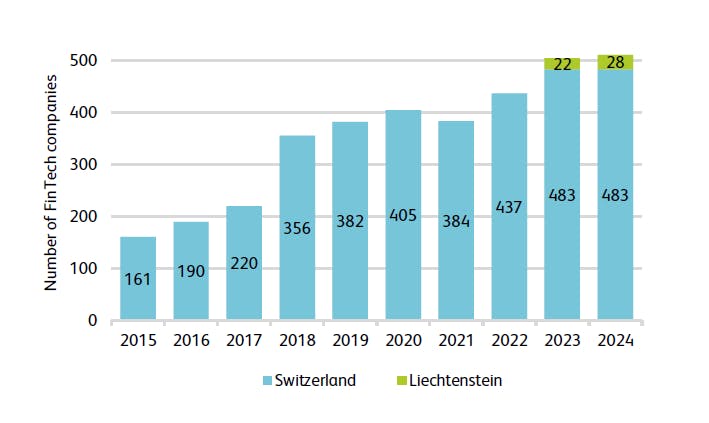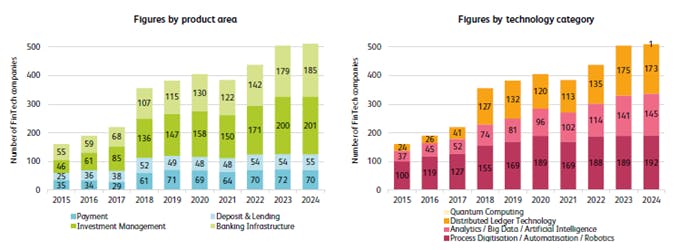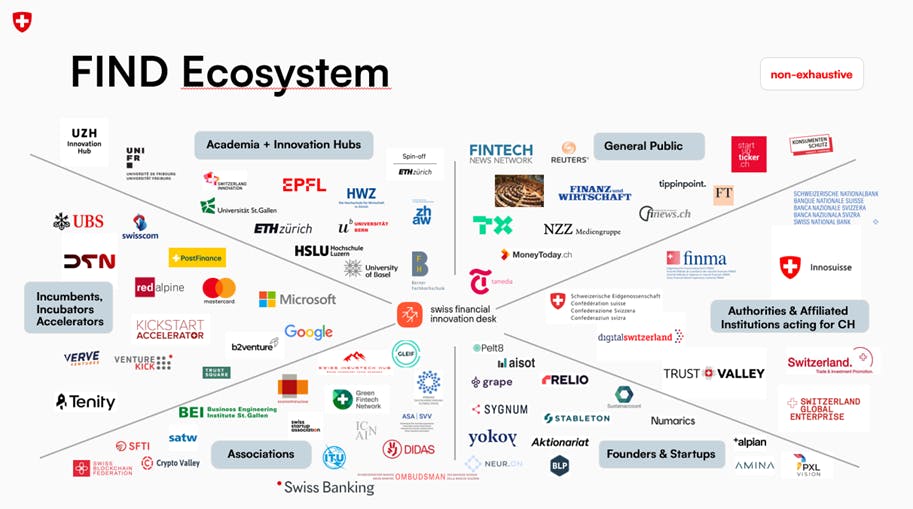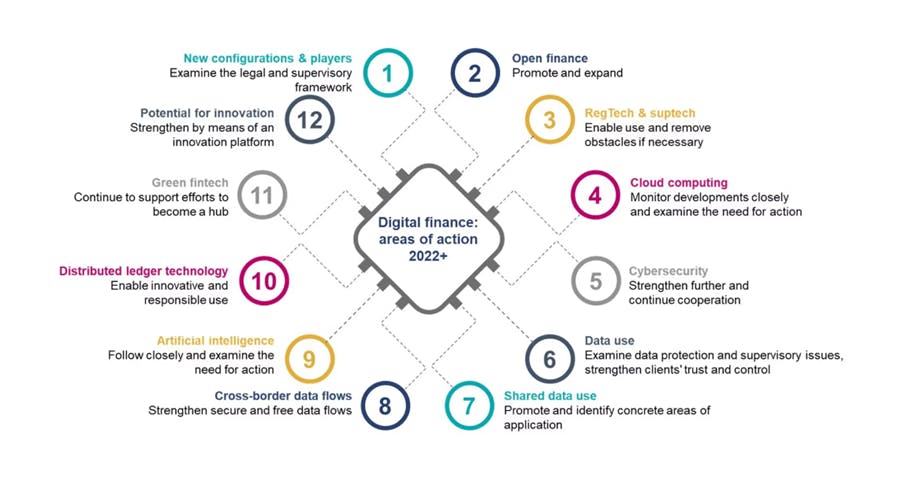Success Factors of Switzerland
Switzerland is fertile ground for financial innovation. It is ranked first in the the Global Innovation Index (GII) for 14 consecutive years. The GII assesses 132 world economies with ca. 80 indicators to measure innovation input and innovation output. The country fosters competition and entrepreneurship through a liberal economic framework and business freedom. A culture of openness and service excellence, supported by a principle-based and technology neutral regulatory environment, encourages trust and long-term creativity.
Furthermore, Switzerland has a dense ecosystem of innovative players: As of 28 March 2025 there are 236 banks, 38 securities firms, 408 fund management companies, managers of collective assets and representatives of foreign collective investment schemes, 195 insurance companies, 1454 trustees and portfolio managers, and 408 fund management companies, managers of collective assets and representatives of foreign collective investment schemes. The ecosystem consists further of big tech companies, disrupting start-ups, industry associations, incubation hubs and accelerators as well as many government units on Federal and Cantonal level that boost financial innovation. This, combined with a well-developed educational system including world-class universities and universities of applied science specializing in finance, creates a perfect ecosystem for financial innovation to flourish.
This above average density of traditional financial institutions is particularly interesting for innovative companies and FinTechs with a B2B business model looking to collaborate with traditional players. After all, Switzerland is the largest booking center worldwide (USD 2.6 trillions as of 2023), more than any other country. On the other hand, Switzerland is also highly attractive for B2C-focused FinTechs due to its high proportion of affluent population.
Somewhat surprisingly, as of 28 March 2025, there are only 4 licensed companies under art. 1b of the Banking Act (so called “FinTech license”). This surprised others as well: One member of the Swiss parliament, Andri Silberschmidt, asked the Federal Council on 19 March 2025 with interpellation 25.3179 how the FinTech license can be further developed to strengthen Switzerland’s competitiveness.
The FinTech landscape in Switzerland
Over the last decade, the Swiss FinTech sector (not every FinTech needs a FinTech license) has developed from a niche market to a key driver of innovation in the financial industry.

Number of Swiss and Liechtenstein FinTech companies by year
Source:IFZ Fintech Study 2025
According to the latest IFZ Fintech Study, the FinTech market in Switzerland is stagnating. At the end of 2024, Switzerland had 483 FinTech companies – the exact same number as in the previous year. While new ones were added, an equal number of companies left the market through liquidations, mergers or other reasons such as leaving Switzerland for another jurisdiction. This balance indicates a possible market saturation, as can also be observed in the traditional finance industry, the main customer of fintech solutions. However, there could also be other reasons, which is why FIND has initiated a survey called “Exit Interview” targeting companies that have left Switzerland or consider leaving Switzerland for another jurisdiction or never came in the first place since another jurisdiction was deemed more favorable. The survey results will be published once properly assessed - in view of the confidential nature of the answers the results will only be published in an anonymized and aggregated format. Because surprisingly, the situation is different in Liechtenstein, where the number of FinTech companies grew from 22 to 28 in 2024 – an impressive 27% annual growth.

Number of FinTech companies by year, and by product area (left-hand graph) and technology category (right-hand graph)
Source:IFZ Fintech Study 2025
When breaking down the technology categories over the last decade, the technology category “Process Digitization / Automatization / Robotics” maintained the largest share, growing relatively steadily from 100 companies in 2015 to 192 in 2024. Similarly, the “Analytics / Big Data / Artificial Intelligence” category expanded gradually, rising from 37 to 145 companies, with particularly strong growth since 2020. “Distributed Ledger Technology” experienced rapid early growth, surging from 41 companies in 2017 to 127 in 2018. After some fluctuation, the number reached 175 in 2023 before declining slightly to 173 in 2024. The study notes the emergence of the very first FinTech company in the Quantum Computing category in 2024. We expect many more to come, for further details see chapter “Quantum-Safe” in our Pathway 2035 for Financial Innovation – Your Navigator publication and our Action Plan to a Quantum-Safe Financial Future.
Swiss government's role in Fostering Financial Innovation
The Swiss government actively promotes financial innovation through several key agencies and initiatives aimed at creating a robust and forward-thinking environment for FinTech and financial services.
The Federal Department of Finance (FDF) is responsible for managing public finances and ensuring financial stability through effective regulatory frameworks. Operating under the umbrella of the FDF is the State Secretariat for International Finance (SIF), which represents Switzerland's interests in international financial matters and supports policies that enhance Switzerland’s competitive position globally (Federal Constitution of the Swiss Confederation / Government and Administration Organisation Act).
Switzerland's Swiss Financial Market Supervisory Authority (FINMA) plays a crucial role in financial innovation by supervising the financial markets with a mandate to protect creditors, investors and insured persons, as well as to safeguard the proper functioning of the financial markets. In doing so, it contributes to strengthening the reputation and competitiveness of the Swiss financial center (art. 5 FINMAG). Those goals may at first glance seem to be conflicting with each other. However, innovation and competitiveness go in our view hand-in-hand and absent innovative business models benefitting B2B and B2C customers it may as well also be argued that financial markets are no longer properly functioning. FIND is thus glad to see that all those goals are mentioned in FINMAG and are hence part of FINMA’s mandate.
Specifically, the government has also established the Swiss Financial Innovation Desk (FIND) as a pilot project, which acts as Switzerland’s primary hub for financial innovation. FIND supports the ecosystem by linking innovation projects, research, investors, and authorities. It facilitates the exchange of information, proposes improvements when it detects innovation hurdles, and enhances Switzerland’s standing as a leading global financial innovation hub through a collaborative and transparent approach (FIND Mandate).

FIND Ecosystem (non-exhaustive enumeration)
Source:FIND
Innosuisse, Switzerland’s Innovation Agency, fosters science-based innovation by connecting research institutions with businesses to help bring new ideas to market. With a focus on projects that strengthen the economy, Innosuisse operates across industries to drive Switzerland's global competitiveness. FIND explored how Innosuisse can support the growth of FinTech venture and has published a “Academia x FinTech x Innosuisse” workshop report and a factsheet “Innosuisse for Fintech Founders”.
Switzerland Global Enterprise (S-GE) also plays a crucial role with its import and export promotion leg, facilitating and supporting many FinTech companies from Switzerland and abroad. It is a joint initiative by SECO and the different cantons active since 1927. is the official Swiss organization for export and investment promotion. S-GE’s FinTech Fact Sheet provides a helpful overview (as per S-GE’s information the fact sheet will be updated in the next few weeks).
Through these institutions, the Swiss government aligns its regulatory practices with a commitment to fostering financial innovation, ensuring that Switzerland remains a world leader in financial services and FinTech development.
Switzerland’s FinTech Strategy
The Federal Department of Finance (FDF), as directed by the Federal Council, issued the Digital Finance Report 2022 to evaluate and enhance Switzerland’s position in the rapidly evolving digital finance sector. The report outlines strategies for promoting innovation, ensuring regulatory clarity, and addressing challenges such as digital payment systems and FinTech developments, all aimed at strengthening Switzerland's competitiveness in global finance. The report is expected to be updated within the next 12 months.
The report outlines 12 areas with key actions for strengthening Switzerland's digital finance ecosystem. By aligning with these strategic directions – such as fostering open finance, advancing AI and DLT technologies, or expanding green fintech initiatives – innovative firms can find fertile ground for growth, contribute to the country’s financial transformation, and shape the future of the Swiss financial sector.

12 Fields of Action
Source:Digital Finance Report 2022
Examine the Legal and Supervisory Framework regarding New Configurations and Players: New financial products and service providers are emerging, requiring a review and possible adjustments to Switzerland’s legal and supervisory frameworks.
Promote and Expand Open Finance: Standardized interfaces can drive innovation in the financial sector by enabling greater participation from all market players.
Enable the Use of RegTech and SupTech: Innovative technologies in financial regulation and supervision offer efficiency gains but require careful management of associated risks.
Closely Monitor Developments in Cloud Computing: With financial institutions increasingly using cloud services, legal and regulatory questions must be addressed to ensure compliance.
Continue Cooperation on Cybersecurity: Cybersecurity is essential for the secure functioning of the digital economy, protecting against risks such as cyberattacks while enabling data usage.
Promote Data Use in the Financial Sector: While there is room for improvement in data-based business models, secure data management is needed to unlock new opportunities.
Foster Shared Data Use in the Financial Centre: Shared data usage can improve financial operations, combat illicit activities, and optimize services, but requires coordinated efforts across sectors.
Support the Use of Artificial Intelligence in the Financial Sector: AI can enhance personalization and risk management but concerns regarding data origin and traceability must be addressed.
Ensure Free Cross-Border Data Flows: Free data movement is vital for global financial activities but must align with Swiss data protection and financial laws.
Enable Innovative and Responsible Use of DLT in the Financial Sector: Optimizing the regulatory framework for Distributed Ledger Technology (DLT) is key to harnessing its potential while ensuring secure implementation.
Continue Efforts to Make Switzerland a Leading Green FinTech Hub: Green fintech is critical to sustainable investing and combating climate change, requiring active promotion both domestically and internationally.
Strengthen the Innovation Potential of the Financial Sector with an Innovation Platform: FIND has been established to foster fintech innovation, which helps the country to position itself as a leading financial hub.
Licenses for FinTechs in Switzerland
In Switzerland, while there is no specific license exclusively for FinTech companies, the country offers a range of licenses that cover various business models within the financial sector. These include licenses for portfolio managers, asset managers, securities firms, and banks, among others. Additionally, Self-Regulatory Organizations (SROs) play an important role in overseeing their members on behalf of the Swiss Financial Market Supervisory Authority (FINMA), and they themselves are directly supervised by FINMA to ensure compliance with regulatory standards.
Under the principle of "same risk, same rules," FinTech companies are required to obtain the appropriate license based on their specific business model and activities. For example, a FinTech providing payment services may need a different license than one managing investment portfolios or offering brokerage services. This framework ensures that the regulatory environment remains consistent and proportionate to the risks posed by each business model, supporting both innovation and financial stability in Switzerland's dynamic FinTech landscape.
For more information, please consult the website of FINMA on licenses and SRO information. These resources provide detailed guidance on licensing and regulatory frameworks in Switzerland's financial sector.
